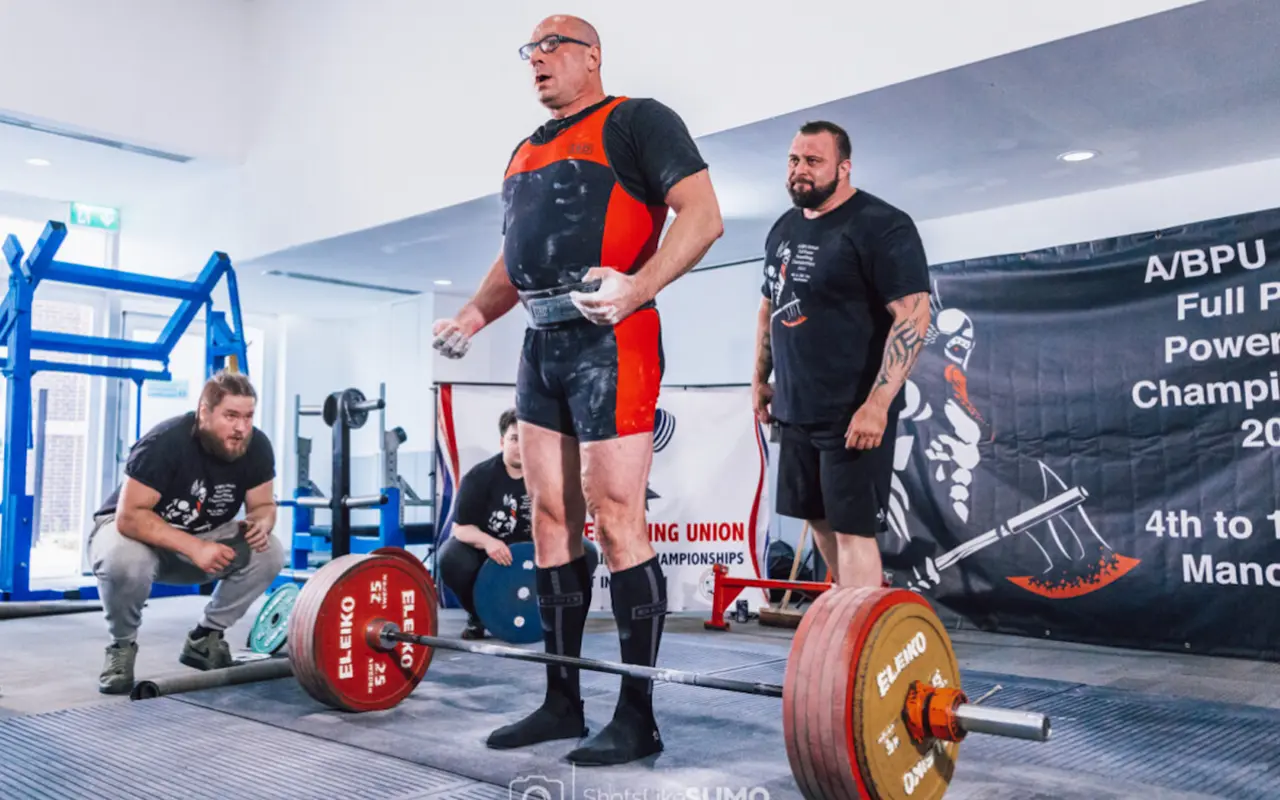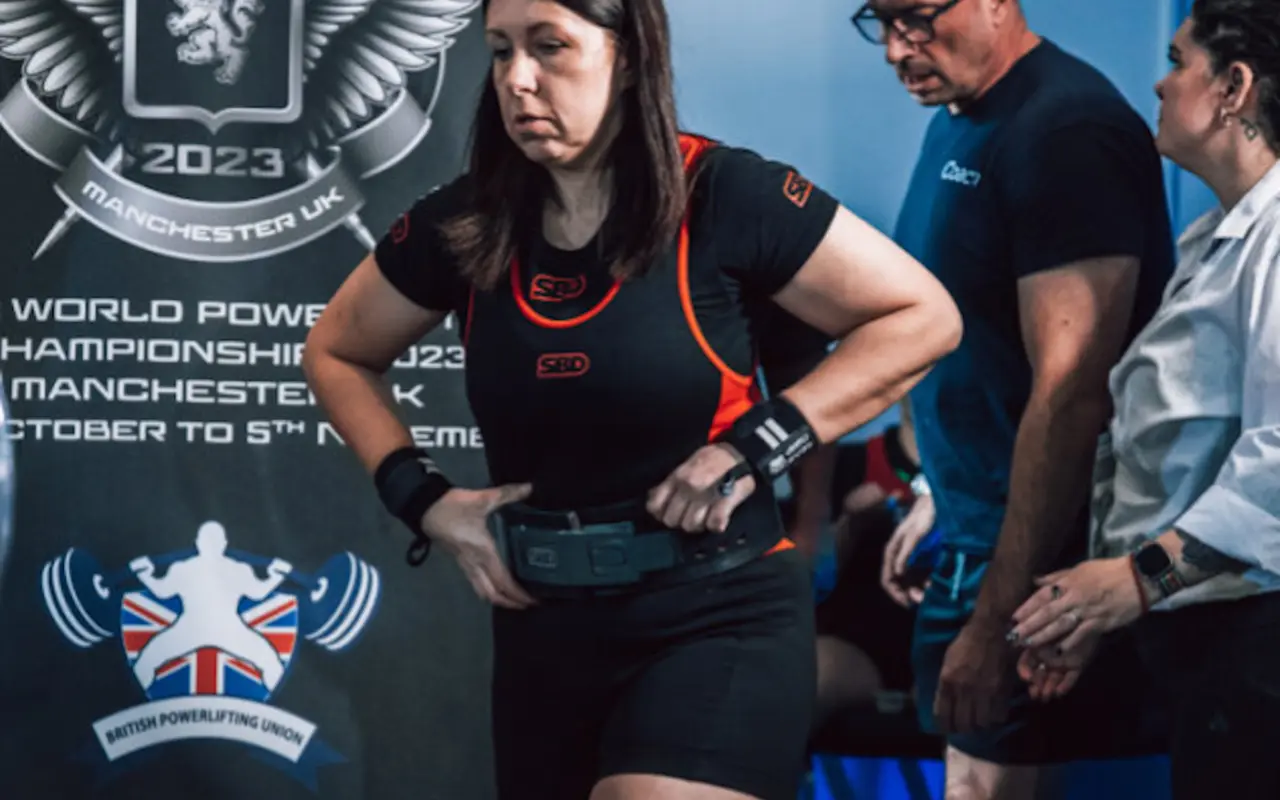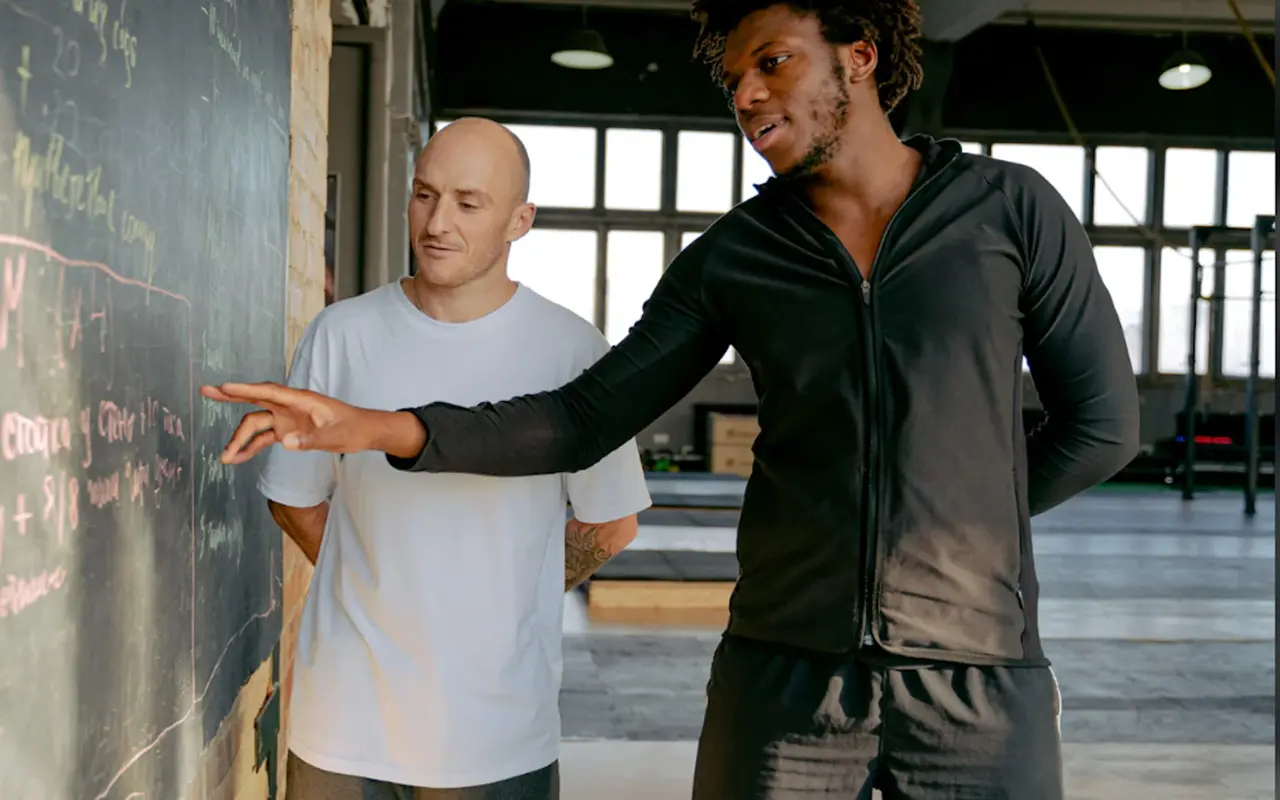Coping with Powerlifting Competition Anxiety: Practical Tips

What's In This Article
- Key Takeaways
- Introduction
- What is Powerlifting Competition Anxiety?
- Pre-Competition Strategies
- During Competition Strategies
- Post-Competition Reflection
- Conclusion
- Frequently Asked Questions
- References and Resources
Key Takeaways
- Powerlifters must address both physical and mental aspects of anxiety through comprehensive strategies before, during, and after competitions to optimize performance.
- Success requires more than physical training - visualization, positive self-talk, and consistent routines build the mental strength needed for competition.
- Using techniques like controlled breathing and process-oriented thinking helps maintain composure during events.
- Post-event analysis and reflection are vital for identifying improvements and continued development in the sport.
- Coaches and support networks are crucial in guiding athletes through their competitive journey.
Introduction
As a powerlifting coach and competitive lifter, I understand that even the strongest athletes can struggle with the invisible weight of competition anxiety. It's not just about what you can lift – it's about handling the pressure when you step on the platform. I've watched lifters battle their minds, dealing with everything from pre-meet jitters to intense stress.
Addressing competition anxiety isn't optional – it's as crucial as your training programming and technique work. This applies whether it's your first meet or you're an elite athlete. I work with my athletes to build their physical strength and mental game, ensuring they're fully prepared when it's time to perform.
Greg Everett, a world champion-level weightlifting coach and best-selling author, acknowledges that competition anxiety never fully disappears. He advised athletes to learn how to "tame" their nervousness, comparing it to transforming a panther into a manageable "kitty.”
What is Powerlifting Competition Anxiety?
Competition anxiety is common in powerlifting and can seriously affect how well you perform. Rebecca Smith, founder of Complete Performance Coaching, emphasizes the importance of addressing stress and fear in competition. Her team of sports psychology professionals works with athletes to develop strategies for overcoming anxiety.
Physical symptoms:
- Fast heartbeat, sweating and shaking due to adrenaline
- Can lead to feeling tired too quickly during lifts
Mental symptoms:
- Fear of failing
- Negative thoughts
- Feeling like you're not good enough
Common triggers:
- Pressure from yourself, coaches, or others to perform well
- Worry about making weight
- Fear of competing against better lifters
- Stress about performing in front of judges and crowds
How it affects your lifting:
- Physical symptoms can drain your strength and stamina
- Fear and doubt make it hard to focus on proper form
- Low confidence makes it harder to approach heavy lifts
- Can throw off your mental state - either making you too amped up or too sluggish
Remember:
Dealing with competition anxiety is normal and part of becoming a better lifter. Billie Asprey, powerlifter, coach and Co-Owner of The Strength Fortress, normalizes competition-day nerves, suggesting that they are inherent in striving for personal bests (PBs). Accepting this rather than resisting it can help lifters focus on their goals and make competing feel like second nature.

Pre-Competition Strategies
Mental Preparation Techniques
Mental preparation techniques are vital in an athlete's arsenal against competition anxiety. Research has shown that Visualization, goal setting, and positive self-talk are among the most effective methods for building confidence and focus (Pandian et al., 2022).
- Visualization involves the athlete mentally rehearsing their performance, envisioning each step. This prepares the mind for the task ahead. It creates a sense of familiarity and control over the competition environment.
- Goal setting provides clear objectives, breaking down the aim of succeeding at the competition into manageable targets. These goals should be specific, measurable, attainable, relevant, and time-bound (SMART), guiding athletes through their preparation with purpose and direction.
- Positive self-talk is the practice of replacing negative thoughts with affirming, encouraging messages. This shift in internal dialogue can significantly impact an athlete's self-confidence and anxiety levels.
Routine Development
A consistent prep routine offers a semblance of normalcy and control amidst the uncertainty of competition. 2022 research by Orbach and Blumenstein focused on preparatory routines for emotional regulation in performance situations. This research highlighted that preparatory routines (PR) are essential for achieving optimal emotional states and effective performance.
- This routine can include specific warm-up exercises, nutrition plans, sleep schedules, and even mental preparation rituals.
- The familiarity of a routine provides a psychological anchor, reducing stress and anxiety by making the competition day feel like a natural extension of the athlete's regular training regimen and life.
Nutritional Considerations
Nutrition plays a subtle yet significant role in managing anxiety. A 2021 scoping review by Aucoin et al. found that "healthy" dietary patterns were associated with reduced anxiety symptoms. Key beneficial components include omega-3 fatty acids, zinc, magnesium, selenium, probiotics, and phytochemicals. Conversely, "unhealthy" diets high in sugar, refined carbohydrates, and processed foods were linked to increased anxiety.
- A well-balanced diet ensures the body is adequately fueled, supporting physical energy and mental health.
- In the lead-up to competition, it's crucial to maintain a diet that stabilizes blood sugar levels, as fluctuations can exacerbate feelings of anxiety.
- Hydration is also key; dehydration can trigger stress responses in the body.
Rest and Recovery
Adequate sleep and recovery are the bedrock of an effective pre-competition strategy.
- High-quality sleep enhances mental clarity and emotional resilience, both of which are essential for managing anxiety. Research from Imperial College London found that sleeping 7-9 hours per night optimizes brain function, enhancing memory, reasoning, and processing speed.
- Rest days are not a sign of laziness but a critical preparation component, allowing the body and mind to recover from training.
- Techniques such as relaxation exercises, meditation, and leisure activities can help lower stress levels, ensuring the athlete approaches competition day refreshed and focused.

During Competition Strategies
Even the most physically prepared athletes can find their hard work compromised by competition anxiety. Implementing specific strategies during the competition can help manage these nerves and physiological arousal.
Breathing Exercises to Ease Performance Anxiety
Breathing exercises are a powerful tool for controlling anxiety and maintaining composure. Deep, controlled breathing can immediately lower heart rate and calm the nervous system.
A simple yet effective technique is the 4-7-8 method:
- Inhale deeply through the nose for four seconds
- Hold your breath for seven seconds
- Exhale slowly through the mouth for eight seconds.
Focusing on the Process, Not the Outcome
Concentrating on the process rather than the outcome helps manage competition day nerves.
- Athletes should direct their attention to the execution of each lift, adhering to the techniques perfected during training (Grgic and Mikulic, 2021).
- This shift in focus away from the scoreboard and towards the present action helps maintain a calm, centered mindset.
- Remembering that each lift is a series of controlled movements rather than a test of ultimate strength can reduce the pressure athletes place on themselves, allowing for a more relaxed and effective performance.
Support Systems
The role of coaches, teammates, and supportive spectators cannot be overstated in mitigating anxiety. Dr Rori Alter and Dr Alyssa Haveson, coaches at Progressive Rehab and Strength, stress the importance of having a handler or coach to manage logistics during competitions. This allows lifters to focus solely on their performance rather than being distracted by external factors like competitor strategies or attempt selections.
- A reassuring word from a coach, teammate encouragement, or audience applause can provide a significant emotional boost.
- These support systems remind that the athlete is not alone, fostering a sense of belonging and confidence.
- Coaches, in particular, can offer last-minute technical advice or strategic encouragement, helping athletes adjust their mindset and approach as needed.
Adapting to the Environment
Familiarity with the competition venue can alleviate many sources of anxiety.
- Athletes should take the opportunity to acquaint themselves with the venue and equipment as early as possible. This can demystify the experience and reduce fear of the unknown.
- Establishing a small, personal space where athletes can retreat, focus, and prepare mentally can also be beneficial.

Post-Competition Reflection
Analyzing Performance Objectively
- Look at what went well and what needs work - try not to be too hard on yourself
- Watch videos of your lifts to check your form and technique
- Ask your coach for feedback - they can spot things you might miss
- Compare how you did against your training leading up to the meet
Remember: The goal is to learn and improve, not beat yourself up over mistakes.
Positive Reinforcement
Acknowledging what went well is vital, regardless of the competition's outcome.
- Positive reinforcement gives a sense of accomplishment and self-worth, which is essential for maintaining motivation and passion for the sport.
- Athletes should make a conscious effort to recognize their successes, be it achieving a personal best, executing a lift with precision, or simply overcoming nerves to perform on the competition day.
- These achievements, no matter how small they may seem the first time, contribute to building confidence and resilience.
Setting Goals for Improvement
Based on the objective analysis and positive aspects of their performance, athletes can set realistic, achievable goals for future competitions.
- Goal setting should be thoughtful, considering the athlete's current level, potential for improvement, and specific areas identified during the reflection phase.
- Goals might range from enhancing technical skills and increasing lift weights to developing better coping strategies for competition anxiety.
- These goals should be SMART (Specific, Measurable, Achievable, Relevant, Time-bound) to provide clear direction and motivation.
Conclusion
In this article, we've discussed strategies for handling stress in powerlifting competitions. These techniques help athletes prepare before, focus during, and reflect after competitions.
Managing competition stress is like building strength; it improves with practice, reflection, and persistence. Each event is a chance to use these methods, improve skills, and gain confidence.
We recommend that all powerlifters include these strategies in their routines and share their experiences with others. Let's create a supportive space where athletes conquer mental challenges along with physical ones, turning stress into growth.
Frequently Asked Questions
Is competition anxiety normal for powerlifters?
It's completely normal and familiar, even among experienced lifters. It's a natural part of the sport that can be managed effectively.
How long before a competition should I start mental preparation?
Start at least several weeks before, incorporating visualization, positive self-talk, and routine development into your regular training schedule.
What should I do if I start panicking right before a lift?
Use the 4-7-8 breathing technique: inhale for 4 seconds, hold for 7, exhale for 8. Focus on the process of the lift rather than the outcome.
Does a bad competition mean I'm not cut out for powerlifting?
No - every competition is a learning opportunity. Use post-competition reflection to identify areas for improvement and set new goals for future meets.
References and Resources
- Aucoin, M., LaChance, L., Naidoo, U., Remy, D., Shekdar, T., Sayar, N., Cardozo, V., Rawana, T., Chan, I., & Cooley, K. (2021). Diet and anxiety: A scoping review. Nutrients, 13(12), 4418.
- Grgic, J., & Mikulic, P. (2021). Effects of attentional focus on muscular endurance: A meta-analysis. International Journal of Environmental Research and Public Health, 19(1), 89.
- Orbach, I., & Blumenstein, B. (2022). Preparatory routines for emotional regulation in performance enhancement. Frontiers in Psychology, 13, 948512.
- Pandian, P. R. S., Kumar, V. B., Kannan, M., Gurusamy, G., & Lakshmi, B. (2022). Impact of mental toughness on athlete's performance and interventions to improve. Journal of Basic and Clinical Physiology and Pharmacology, 34(4), 409-418.
- John Hopkins
- Competition Anxiety PDF
- Believe Perform
- Performance Psychology Center